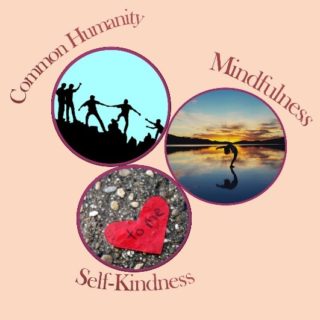Be Kind to Yourself

To Begin I’d like you to watch THIS VIDEO.
What thoughts came up for you as you watched this video? Were you able to relate to what the individuals were saying? Did you understand why they answered the way they did? I’d like you to take a moment to reflect on a time when you made a mistake, and some of the things that you said to yourself. What sort of words did you use? How did those words affect you? Now think of the last time a loved one came to you and told you about a mistake. How did those words differ from the ones you told yourself? I’m willing to bet that there is a big difference in how you speak to yourself versus how you speak to others.
Why Self Compassion?
I’m sure you’ve heard the term self-compassion before. Maybe you wondered why it was important, or why people even bother talking about it. Maybe you thought you didn’t need to be self-compassionate, or that it simply wasn’t something that would impact your life. Kristin Neff (2012) suggests that self-compassion is more than looking on the bright side or attempting to avoid negative feelings. Self-compassionate people are able to recognize when they are suffering, but act kindly towards themselves. Neff (2012) further explains that studies have indicated that individuals with higher levels of self-compassion experience less anxiety and self-consciousness when asked about their weaknesses, display more wisdom and emotional intelligence, and often experience higher levels of social connectedness and overall life satisfaction.
If we can learn to be kinder to ourselves, we can learn to let go of our mistakes and shortcomings, and move forward from them. This doesn’t necessarily mean ignoring them, but rather not allowing them to hook us into a pattern of self-depreciation and dislike. Instead, we can accept our mistakes/shortfalls/situations for what they are, learn from them, and move forward.
So how do I be Kinder to Myself?
Being compassionate towards oneself is similar to the way that we express compassion for others. As in the video above, it is clear that many of us are better able to be compassionate towards our loved ones than we are to ourselves. Learning how to be self-compassionate will not happen overnight; it may take time, practice, and trial and error.
Neff (2012) posits that there are three main components to having compassion for oneself:
- Self-kindness
- A sense of common humanity
- Mindfulness

In short, these three aspects of self-compassion involve being understanding towards ourselves and our downfalls; recognizing that we are not alone and that other people struggle as well; and practicing living in the moment and accepting some of our thoughts, feelings, and emotions. What self-compassion is not, is self-pity, self-indulgence, or self-esteem (Neff, 2012). To learn more about how you can be more self-compassionate, click here to read Kristin Neff’s chapter on The Science of Self-Compassion.

Source: Neff, K. D. (2012). The science of self-compassion. In C. Germer & R. Siegel (Eds.), Compassion and Wisdom in Psychotherapy (pp. 79-92). New York: Guilford Press.

